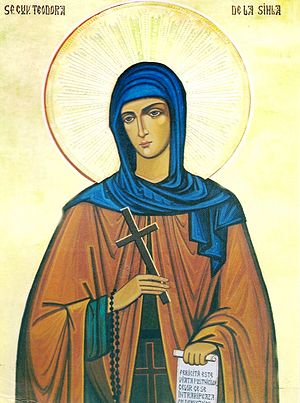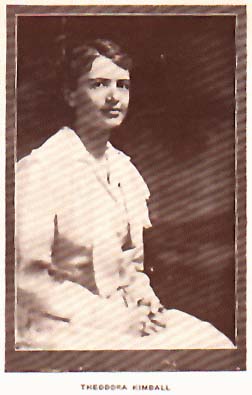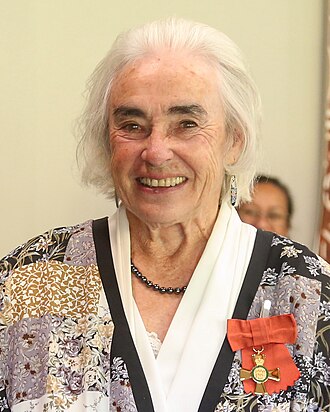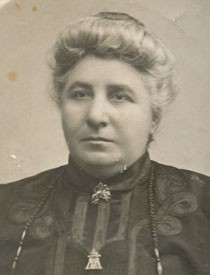Discover Your Roots
SIGN UPDiscover Your Roots
SIGN UPThe name Theodora is of Greek origin and is primarily given to females. Its meaning, "Gift Of God" or "Divine Gift," reflects the name's roots in the Greek words for "god" and "gift." The name has a rich history, with early attestations in Mycenaean Greek and associations with saints and queens, including a 6th-century Byzantine empress who was honored as a saint in the early Christian Church. Variants of the name can be found in various languages and cultures, such as Teodora in Serbian and Thea in English and German. Theodora has also been featured in popular culture as a character in films and literature. Overall, Theodora is a timeless and meaningful name that carries a sense of divine blessing and significance.

Theodora of Sihla, also known as Teodora or Bohdanna of the Carpathians, was a Christian ascetic and Romanian Orthodox saint born around 1650. She was commemorated on 7 August. Theodora's early life was marked by her marriage against her will and her subsequent decision, along with her husband, to embrace monasticism. She then retreated into the Buzău Mountains and later became an anchorite in the Sihla wilderness. After her death, her body remained in the cave where she had spent most of her hermitage. The knowledge of her life and death reached her husband, who spent the last decade of his life close to her resting place. The Sihla Monastery was founded in her memory, and she was later translated to Pechersk Lavra in Kiev. The Romanian Orthodox Church canonized her on 20 June 1992, establishing her commemoration on 7 August. Theodora's life is celebrated for her dedication to asceticism and her enduring legacy as a saint in the Romanian Orthodox tradition.

Theodora Morse (July 11, 1883 — November 10, 1953) was a renowned American songwriter and composer, widely recognized for her influential contributions to Tin Pan Alley. Born as Alfreda Theodora Strandberg in Brooklyn, New York, she married Theodore F. Morse in 1907, forming a successful songwriting partnership. The couple, known professionally as Terriss & Morse, became one of the earliest husband-wife songwriting teams in Tin Pan Alley. Theodora also collaborated with other composers, often using pseudonyms such as Dorothy Terriss, Dolly Morse, and D. A. Esrom. Notably, she penned the lyrics for the popular song "Hail, Hail, the Gang's All Here," as well as "Three O'Clock in the Morning," which was recorded by Paul Whiteman and his orchestra. Another notable work is "Wonderful One," a jazz and pop standard with lyrics by Theodora Morse. Her impactful career in music came to an end when she passed away at the age of 70 in White Plains, New York. Some of her selected works include "Hail, Hail, the Gang's All Here" (1917), "Soldier Boy" (1915), "Three O'Clock in the Morning" (1921), and "Wonderful One" (1922).

Theodora Kimball Hubbard (1887–1935) was a pioneering figure in the field of landscape architecture, recognized as the first librarian of the Harvard School of Landscape Architecture. Born in West Newton, Massachusetts, she graduated from Simmons College and later earned a master's degree in Library Science. Hubbard's early career included roles at The New England Historical and Genealogical Register, Boston Public Library, and the U.S. Bureau of Industrial Housing and Transportation. She later became a prominent figure at Harvard, teaching at the Cambridge School of Architecture and Landscape Architecture. Notably, Hubbard transformed the library of the Harvard School of Landscape Architecture, consolidating collections and pioneering organizational systems for visual and graphic media. Her contributions extended to the development of the first Library of Congress Classification for landscape architecture and city planning, with the assistance of her husband, Henry Vincent Hubbard. Additionally, she served on President Herbert Hoover's advisory Committee on Zoning in Washington. Hubbard's impact on the field of landscape architecture and her significant collaborations with influential figures have left a lasting legacy.

Theodora Mary "Dido" Götz, born on January 11, 1946, is a prominent figure in New Zealand gymnastics. As a former gymnast, coach, and judge, Götz has left a lasting impact on the sport. She began her career by clinching the women's national championship five times, showcasing her exceptional talent and dedication. Representing New Zealand at the 1964 Summer Olympics in Tokyo, Götz demonstrated her skills in various gymnastic disciplines. After retiring from competitive gymnastics, she transitioned into coaching and judging, continuing to contribute to the sport. Notably, Götz was honored with the title of Officer of the New Zealand Order of Merit for her remarkable services to gymnastics, a true testament to her enduring influence. Passionate and devoted, Götz's enduring commitment to gymnastics has solidified her legacy as a revered figure in the New Zealand gymnastics community.

Theodora Noeva (Bulgarian: Теодора Ноева) was a prominent Bulgarian women's rights activist during the late 19th and early 20th centuries. She is celebrated for co-founding and editing the first Bulgarian women's magazine, Женский свят ('Women's world'), where she advocated for women's rights to equal pay and professional opportunities. Notably, in 1896, she made waves by requesting to be registered as a voter in Varna, drawing significant attention to the cause of women's suffrage. Noeva's work extended beyond activism, as she was also recognized for her philanthropy, establishing educational funds for boys and a refuge for the elderly. Her dedication to gender equality and social welfare earned her a medal from Boris III in 1937. Noeva's legacy endures as she is regarded as one of the pioneering figures in the fight for women's rights in Bulgaria.
All images displayed on this page are sourced from Wikipedia or Wikimedia Commons.We use these images under their respective Creative Commons or public domain licenses. Wherever applicable, author attributions and license information are provided. If you believe an image is used incorrectly or outside its license terms, please contact us so that we can review and correct the issue.